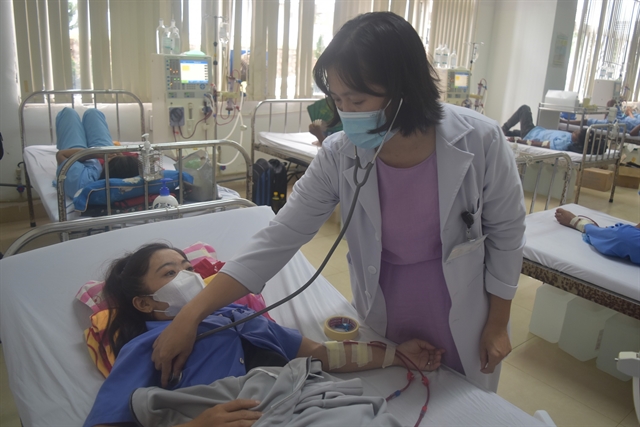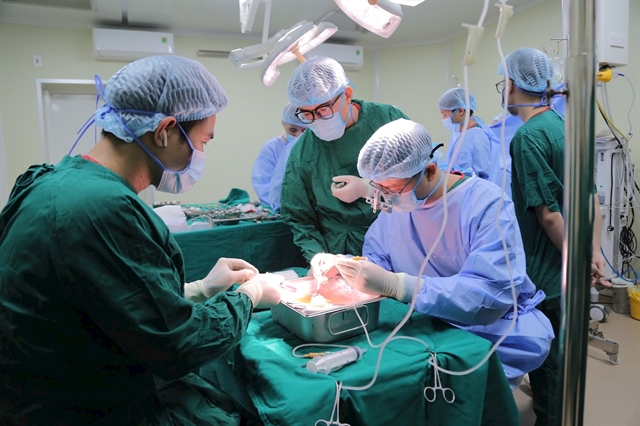 Society
Society

 |
| Leaders of the Hanoi Department of Health and Đức Giang General Hospital present flowers to patient when he is discharged from the hospital. — Photo courtesy of the hospital |
HÀ NỘI — Đức Giang General Hospital has successfully performed its first three kidney transplants, mastering techniques trained and transferred from the experts of the Military Medical Hospital 103.
The hospital has become the second medical facility under the Hanoi Department of Health (after Saint Paul General Hospital) to be named on the organ transplant map of Việt Nam.
The first case was N.T.B.H, 26, living in Tuyên Quang Province who was diagnosed with end-stage chronic kidney failure in early 2022 and required dialysis three times a week.
The patient was donated a kidney by his biological mother. The special thing about this transplant pair is that the mother is older and her body is smaller than her child's, so the risk of graft kidney function is difficult to achieve as expected.
However, with careful preparation of human resources and medical equipment, the transplant was carried out successfully on September 8, 2024. After transplantation, the health of both the donor and recipient was completely stable.
The second case was L.B.C, 19, living in Thanh Hóa Province. In April 2024, he was hospitalised after showing signs of fatigue, dizziness, lightheadedness and frequent rashes. Examination and diagnosis results showed that he had end-stage kidney failure and required dialysis three times a week.
Luckily, through screening tests of family members, his biological mother's kidney was suitable for transplantation to the patient. On September 11, the hospital’s medical team performed surgery to remove a kidney from the mother and transplant it to her son.
After more than six hours of surgery, the transplant was successful beyond expectations. After the transplant, the health of patient C and his mother both improved.
The third case was P.T.H, a 24-year-old man living in Nam Định Province. He was diagnosed with glomerulonephritis in 11th grade. To maintain his health, H always took medicine regularly following the doctor's prescription. When the COVID-19 pandemic hit, H did not go to the doctor regularly for a long time, leading to end-stage kidney failure.
 |
| Đức Giang General Hospital's surgical team preforms a kidney transplant. — Photo courtesy of the hospital |
In August 2024, H's mother registered for her son to receive an organ transplant when she learned that Đức Giang General Hospital would carry out an organ transplant programme. After testing with highly compatible results between mother and child, the transplant was conducted successfully on September 13. Currently, the health of both mother and H is progressing well.
Dr Nguyễn Văn Thường, Director of the Đức Giang General Hospital said that after the success of the first three transplants, the hospital will introduce kidney transplant techniques into routine implementation.
“It is expected that next week, the hospital will carry out two more kidney transplants. So, in just one month, the hospital will be able to transplant five cases and will eventually transplant kidneys from brain-dead donors," said Dr Thường.
Dr Nguyễn Văn Tuyên, Head of the Department of Nephrology - Urology, Đức Giang General Hospital said that to maintain life, kidney failure patients must go to the hospital for dialysis once every other day. Currently, the department has nearly 180 patients with end-stage chronic kidney failure on dialysis.
Dr Tuyên said: “Every day there are 80 patients undergoing dialysis divided into three shifts. This makes patients and their families tired, has to travel a lot, and is expensive.
"Mastering kidney transplant techniques at Đức Giang General Hospital will contribute to improving the quality of life for kidney failure patients.” — VNS




